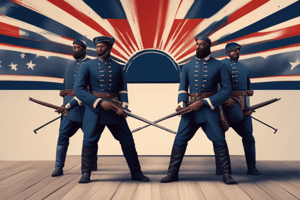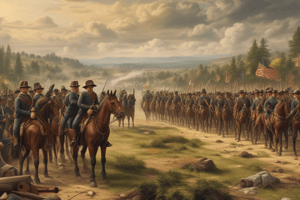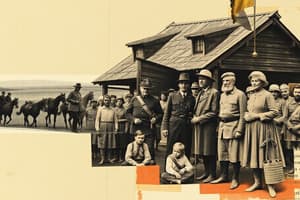Podcast
Questions and Answers
The American Civil War lasted from 1861 to 1865, bringing an end to ______ in America.
The American Civil War lasted from 1861 to 1865, bringing an end to ______ in America.
slavery
The southern states felt threatened by the growing power of the industrial North, which they believed would lead to a decline in their traditional ______ economy.
The southern states felt threatened by the growing power of the industrial North, which they believed would lead to a decline in their traditional ______ economy.
agrarian
Economically, the North focused more on industry and trade, while the South relied heavily on ______.
Economically, the North focused more on industry and trade, while the South relied heavily on ______.
agriculture
Social differences fueled the conflict as many people in the North opposed slavery morally and viewed it as a violation of ______ rights.
Social differences fueled the conflict as many people in the North opposed slavery morally and viewed it as a violation of ______ rights.
Slaves themselves resisted and sometimes violently protested their ______.
Slaves themselves resisted and sometimes violently protested their ______.
The debate over whether each state could decide for itself whether to allow ______ or not divided opinion.
The debate over whether each state could decide for itself whether to allow ______ or not divided opinion.
Known as the Missouri Compromise of 1820, this issue resolved the immediate crisis by prohibiting ______ above the 36°30' line northwards, except in Missouri and Maine.
Known as the Missouri Compromise of 1820, this issue resolved the immediate crisis by prohibiting ______ above the 36°30' line northwards, except in Missouri and Maine.
Moreover, political arguments deepened when the question of whether newly admitted states could enter the Union as either free or ______ states emerged.
Moreover, political arguments deepened when the question of whether newly admitted states could enter the Union as either free or ______ states emerged.
This struggle culminated in the Kansas-Nebraska Act of 1854, which allowed settlers in those territories to determine whether ______ would be permitted within them.
This struggle culminated in the Kansas-Nebraska Act of 1854, which allowed settlers in those territories to determine whether ______ would be permitted within them.
Despite efforts to navigate these conflicts peacefully, the deepening divisions proved unsustainable, leading to ______ and finally, armed conflict.
Despite efforts to navigate these conflicts peacefully, the deepening divisions proved unsustainable, leading to ______ and finally, armed conflict.
Flashcards are hidden until you start studying
Study Notes
American Civil War Causes
The American Civil War was a pivotal event in U.S. history, lasting from 1861 to 1865. This war brought an end to slavery in America and redefined the country's political landscape. While there were many factors leading up to this conflict, several key issues played a significant role in its outbreak. These causes can be categorized into three main areas: economic, social, and political reasons.
Economic Reasons
Economically, the North and South had vastly different agricultural systems. The northern states focused more on industry and trade, while the southern states relied heavily on agriculture, with their economy largely based on slave labor. The southern states felt threatened by the growing power of the industrial North, which they believed would lead to a decline in their traditional agrarian economy and threaten their way of life. This economic disparity contributed to tensions between the two regions.
Social Reasons
Social differences also fueled the conflict. Slavery became increasingly controversial as society evolved. Many people in the North opposed it morally and viewed it as a violation of human rights. They advocated for abolition and fought against its expansion into new territories acquired through westward expansion. Meanwhile, slaves themselves resisted and sometimes violently protested their bondage. All these factors led to escalating tensions and disagreements over the issue of slavery, exacerbating the divide between the North and the South.
Political Reasons
Political considerations further complicated matters. The debate over whether each state could decide for itself whether to allow slavery or not divided opinion. Some wanted all states to have equal representation in Congress regardless of the number of free inhabitants, while others argued for proportional representation based on population. Known as the Missouri Compromise of 1820, this issue resolved the immediate crisis by prohibiting slavery above the 36°30' line northwards, except in Missouri and Maine. However, it did not resolve underlying tensions.
Moreover, political arguments deepened when the question of whether newly admitted states could enter the Union as either free or slave states emerged. Northerners generally favored free soil states, while Southerners feared being outvoted if too many new free states joined the Union. This struggle culminated in the Kansas-Nebraska Act of 1854, which allowed settlers in those territories to determine whether slavery would be permitted within them. However, it also led to intense violence known as Bleeding Kansas, where pro-slavery and anti-slavery forces clashed, further inflaming tensions.
In conclusion, the complex mix of economic, social, and political issues created a volatile situation that ultimately resulted in the American Civil War. Despite efforts to navigate these conflicts peacefully, the deepening divisions proved unsustainable, leading to secession and finally, armed conflict. Understanding these causes helps us appreciate the complexity of this critical period in American history.
Studying That Suits You
Use AI to generate personalized quizzes and flashcards to suit your learning preferences.




